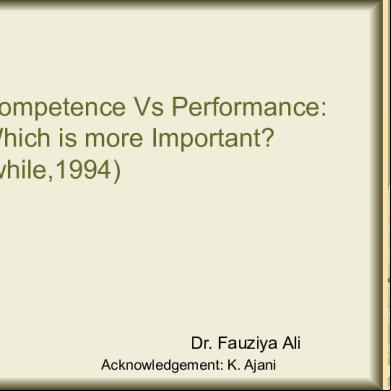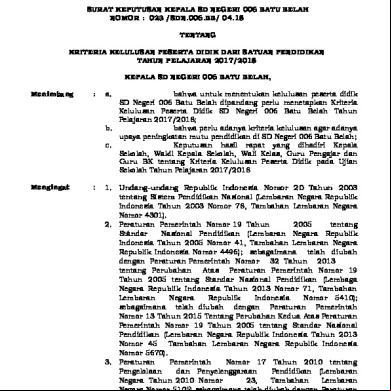Competence Vs Performance 5r2h25
This document was ed by and they confirmed that they have the permission to share it. If you are author or own the copyright of this book, please report to us by using this report form. Report 2z6p3t
Overview 5o1f4z
& View Competence Vs Performance as PDF for free.
More details 6z3438
- Words: 551
- Pages: 16
Competence Vs Performance: Which is more Important? (while,1994)
Dr. Fauziya Ali Acknowledgement: K. Ajani
Objectives Define Competence and Performance Link between competence and performance Factors affecting performance Assessment of competence
Definitions Competency A specified attribute that may be possessed by someone. A quality or state of being which characterizes a person as being competent.
Competence
A simultaneous integration of the knowledge, skills and attitude that are required for performance in a designated role and setting. (Alspach 1984, as cited in Gurvis,1995)
Four normative Performance may be measured for conceptualizations of competence regarding specific behavior competence: Competence can be viewed as having
command of pertinent knowledge and/or skills Competence may be seen as indicative of a degree of capability deemed sufficient in a particular activity Finally, a holistic conceptualization of competence includes knowledge, skills, attitudes, performances and levels of sufficiency.
Use of competencies in Nursing Regulatory Bodies Developing qualifications Prescribing educational programmes Assessing competence to practice licensing
Nursing Education Guiding learners Guiding educators Guiding assessors Recognizing achievements
Management Job Profiling Performance management Career pathing Recruitment Internships Uys,2003
Performance Performance is the actual doing or carrying out any act (oxford dictionary, 2005) Performance on tests has been/is being equated with competencies. The professional codes will always refer to a minimum level of performance whereas the educational literature frequently refers to competence as the outcome of nurse education programmes.
Factors affecting Performance Own expectation Expertise on particular skills Preparation of the individual Attitudes and expectations of Heads Nature of work assignment and Quality and amount of workrelated communications
Issues Being qualified Vs being competent?
Thoughts There is a difference between what an individual should be able to do at an expected level of achievement and what they actually do in the real life setting.
Essential Elements of Competency Based Approach Competencies to be achieved are identified, verified, and made public in advance. Criteria for assessing achievement and the conditions under which achievements will be assessed are explicitly stated and made public in advance.
Essential Elements of Competency Based Approach (cont) The educational programme
provides for the individual development and evaluation for each of the competencies specified. Assessment of competency takes the participants knowledge and attitudes into , but requires actual performance of the competency as the primary source of evidence.
Essential Elements of Competency Based Approach (cont) Participants progress through the educational programme at their own rate by demonstrating the attainment of the specified competencies.
In Conclusion Competence in the form of knowledge and skills is much broader, but lacks the dimension of what constitutes “enough”.
Competence in the form of a judgment of an adequate or sufficient level of capability is still more comprehensively applicable. Competence in the form of qualities or states of being is the most comprehensive form. Of all the forms of competence, this is the conception that should be applied.
References Gonczi A. (1994) Competency based assessment in the professions in Australia. Assessment in Education 1, 27–44. Greenhaigh T. & Macfarlane F. (1997) Towards a competency grid for evidence-based practice. Journal of Evaluation in Clinical Practice 3, 161–165. Gurvis J.P. (1995) The anatomy of a competency. Journal of Nursing Staff Development 11, 247– 252. Short E.C. (1984) Competence reexamined. Educational Theory 34, 201–207. While A.E. (1994) Competence versus performance: which is more important? Journal of Advanced Nursing 20, 525–531.
Dr. Fauziya Ali Acknowledgement: K. Ajani
Objectives Define Competence and Performance Link between competence and performance Factors affecting performance Assessment of competence
Definitions Competency A specified attribute that may be possessed by someone. A quality or state of being which characterizes a person as being competent.
Competence
A simultaneous integration of the knowledge, skills and attitude that are required for performance in a designated role and setting. (Alspach 1984, as cited in Gurvis,1995)
Four normative Performance may be measured for conceptualizations of competence regarding specific behavior competence: Competence can be viewed as having
command of pertinent knowledge and/or skills Competence may be seen as indicative of a degree of capability deemed sufficient in a particular activity Finally, a holistic conceptualization of competence includes knowledge, skills, attitudes, performances and levels of sufficiency.
Use of competencies in Nursing Regulatory Bodies Developing qualifications Prescribing educational programmes Assessing competence to practice licensing
Nursing Education Guiding learners Guiding educators Guiding assessors Recognizing achievements
Management Job Profiling Performance management Career pathing Recruitment Internships Uys,2003
Performance Performance is the actual doing or carrying out any act (oxford dictionary, 2005) Performance on tests has been/is being equated with competencies. The professional codes will always refer to a minimum level of performance whereas the educational literature frequently refers to competence as the outcome of nurse education programmes.
Factors affecting Performance Own expectation Expertise on particular skills Preparation of the individual Attitudes and expectations of Heads Nature of work assignment and Quality and amount of workrelated communications
Issues Being qualified Vs being competent?
Thoughts There is a difference between what an individual should be able to do at an expected level of achievement and what they actually do in the real life setting.
Essential Elements of Competency Based Approach Competencies to be achieved are identified, verified, and made public in advance. Criteria for assessing achievement and the conditions under which achievements will be assessed are explicitly stated and made public in advance.
Essential Elements of Competency Based Approach (cont) The educational programme
provides for the individual development and evaluation for each of the competencies specified. Assessment of competency takes the participants knowledge and attitudes into , but requires actual performance of the competency as the primary source of evidence.
Essential Elements of Competency Based Approach (cont) Participants progress through the educational programme at their own rate by demonstrating the attainment of the specified competencies.
In Conclusion Competence in the form of knowledge and skills is much broader, but lacks the dimension of what constitutes “enough”.
Competence in the form of a judgment of an adequate or sufficient level of capability is still more comprehensively applicable. Competence in the form of qualities or states of being is the most comprehensive form. Of all the forms of competence, this is the conception that should be applied.
References Gonczi A. (1994) Competency based assessment in the professions in Australia. Assessment in Education 1, 27–44. Greenhaigh T. & Macfarlane F. (1997) Towards a competency grid for evidence-based practice. Journal of Evaluation in Clinical Practice 3, 161–165. Gurvis J.P. (1995) The anatomy of a competency. Journal of Nursing Staff Development 11, 247– 252. Short E.C. (1984) Competence reexamined. Educational Theory 34, 201–207. While A.E. (1994) Competence versus performance: which is more important? Journal of Advanced Nursing 20, 525–531.










